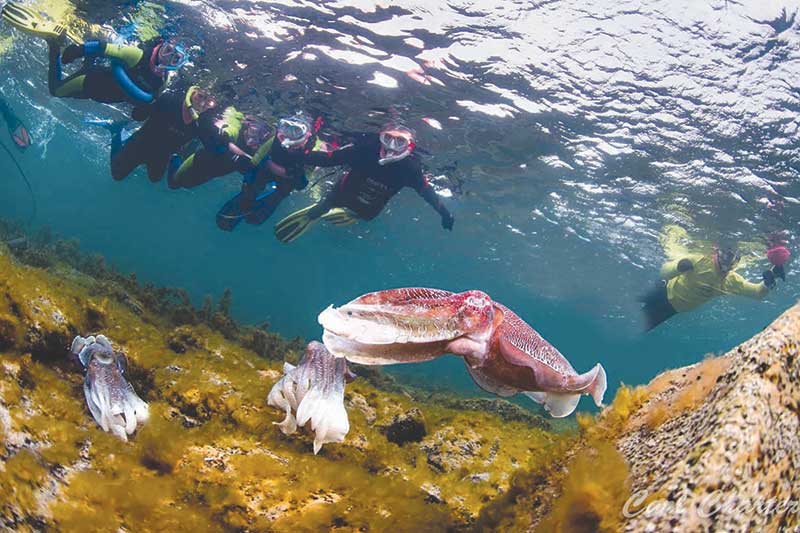Next Gen Citizen Scientists
By Heather Creech

Scientists and educators have been working side-by-side to develop the concept of ocean literacy—an understanding of the ocean’s influence on us and our influence on the ocean—to address head-on the lack of ocean-related content in education, instructional materials, and assessment. It takes only a little searching online to find ocean literacy resources suitable for children and young adults. There are teacher and student guides; project ideas; and games that explore how the ocean supports life, influences climate, and affects human life and livelihoods, and how we in turn impact the ocean.
But it is harder to find examples of experiential learning in the marine environment—getting kids into the water to explore the magic that lies just under the surface. How can experiential programs be organized so that kids not only learn why the ocean is so important, but also become engaged in sharing what they’ve seen? How can we foster the next generation of marine citizen scientists and inspire our children to understand and value the ocean around us?
Experiential programs
Dr. John Cigliano and colleagues have explored the challenge of ‘making marine and coastal citizen science matter’ in some depth. Their findings, published in 2015 in the journal Oceans and Coastal Management, suggest that there is considerable scope for children to participate in citizen science, “motivated by the fact that they can and do contribute to scientific and conservation outcomes.” In their view, citizen science programs developed for kids raise awareness, inspiration, and the confidence that they can help to change the world. But the authors also recognize challenges and barriers in getting young people out into the ocean: transportation, water safety, and—in so many cases—lack of access to a coastline. They suggest that teachers turn to modelling marine ecosystems and introducing students to online marine citizen science projects, “like Seafloor Explorer or WhaleFM, which use visual and audio technology respectively, to immerse participants in marine simulations.”
Where it is possible to get kids into the ocean, there are a few good models to follow. One long standing experiential program is the New Zealand-based Experiencing Marine Reserves, or in Maori, Te Kura Moana—the school of the ocean. Established in eight regions across the country, the coordinators say they “provide schools and their communities with the expertise and knowledge to experience their local marine environment first-hand.” Classroom exercises, pool and sheltered water training are followed by field trips to open water marine reserves. Based on this experience, “Students are able to compare unprotected and protected areas and are encouraged to put their knowledge into action within the community.” Nearly 55,000 students, teachers and extended families have gone through the program.
To involve children and young adults in ocean literacy and marine citizen science activities, there are a few important considerations, such as training: while swimming skills are important, training in snorkelling will be needed, especially for those who may be enthusiastic but not as confident in open water. Appropriate gear has to be provided, and in particular wetsuits that will help children retain body warmth while moving slowly through the water to observe fish and habitat. Adult supervision is essential—one program requires that all kids 15 and under must be accompanied in the water by an adult/parent. And don’t forget to have lots of Identification slates to carry in the water, and more guides and reference books to consult when they come out.
Creating advocates
The joy of running these programs is immeasurable. Carl Charter, the co-founder and Executive officer of South Australia’s Experiencing Marine Sanctuaries describes one incident and what it means to him—and the future of the oceans: Squealing through her snorkel a young participant swims up to me, pops her snorkel out and excitedly tells me about the marine life she has just experienced: “Oh wow I saw a baby Port Jackson shark swim past within metres! They are so amazing!”
It is excitement like this that makes all the hard work worthwhile. These participants experience marine life with their own eyes, learn about it, fall in love with it, and advocate for its protection.







